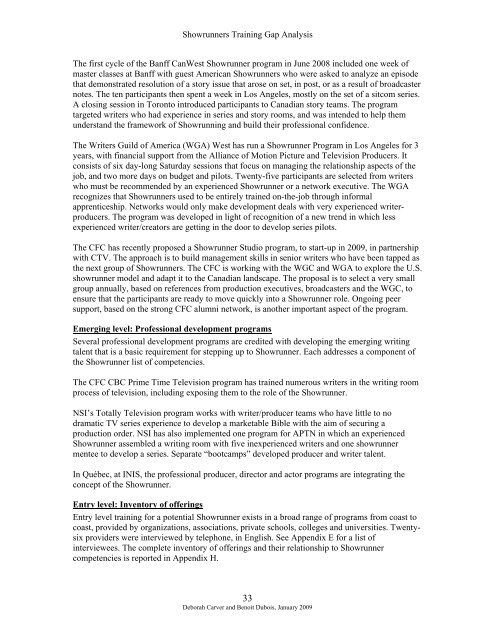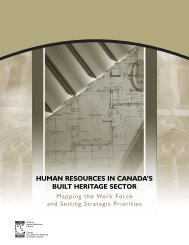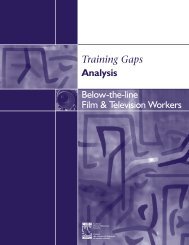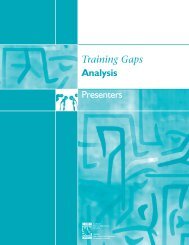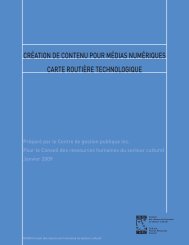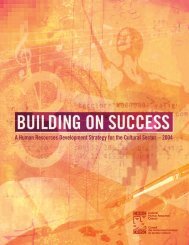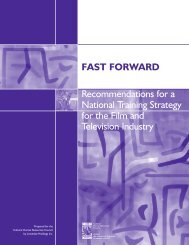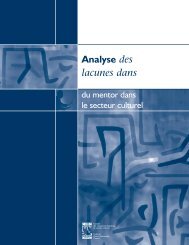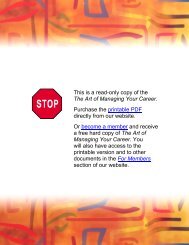Showrunners - Training Gaps Analysis - Cultural Human Resources ...
Showrunners - Training Gaps Analysis - Cultural Human Resources ...
Showrunners - Training Gaps Analysis - Cultural Human Resources ...
You also want an ePaper? Increase the reach of your titles
YUMPU automatically turns print PDFs into web optimized ePapers that Google loves.
<strong>Showrunners</strong> <strong>Training</strong> Gap <strong>Analysis</strong><br />
The first cycle of the Banff CanWest Showrunner program in June 2008 included one week of<br />
master classes at Banff with guest American <strong>Showrunners</strong> who were asked to analyze an episode<br />
that demonstrated resolution of a story issue that arose on set, in post, or as a result of broadcaster<br />
notes. The ten participants then spent a week in Los Angeles, mostly on the set of a sitcom series.<br />
A closing session in Toronto introduced participants to Canadian story teams. The program<br />
targeted writers who had experience in series and story rooms, and was intended to help them<br />
understand the framework of Showrunning and build their professional confidence.<br />
The Writers Guild of America (WGA) West has run a Showrunner Program in Los Angeles for 3<br />
years, with financial support from the Alliance of Motion Picture and Television Producers. It<br />
consists of six day-long Saturday sessions that focus on managing the relationship aspects of the<br />
job, and two more days on budget and pilots. Twenty-five participants are selected from writers<br />
who must be recommended by an experienced Showrunner or a network executive. The WGA<br />
recognizes that <strong>Showrunners</strong> used to be entirely trained on-the-job through informal<br />
apprenticeship. Networks would only make development deals with very experienced writerproducers.<br />
The program was developed in light of recognition of a new trend in which less<br />
experienced writer/creators are getting in the door to develop series pilots.<br />
The CFC has recently proposed a Showrunner Studio program, to start-up in 2009, in partnership<br />
with CTV. The approach is to build management skills in senior writers who have been tapped as<br />
the next group of <strong>Showrunners</strong>. The CFC is working with the WGC and WGA to explore the U.S.<br />
showrunner model and adapt it to the Canadian landscape. The proposal is to select a very small<br />
group annually, based on references from production executives, broadcasters and the WGC, to<br />
ensure that the participants are ready to move quickly into a Showrunner role. Ongoing peer<br />
support, based on the strong CFC alumni network, is another important aspect of the program.<br />
Emerging level: Professional development programs<br />
Several professional development programs are credited with developing the emerging writing<br />
talent that is a basic requirement for stepping up to Showrunner. Each addresses a component of<br />
the Showrunner list of competencies.<br />
The CFC CBC Prime Time Television program has trained numerous writers in the writing room<br />
process of television, including exposing them to the role of the Showrunner.<br />
NSI’s Totally Television program works with writer/producer teams who have little to no<br />
dramatic TV series experience to develop a marketable Bible with the aim of securing a<br />
production order. NSI has also implemented one program for APTN in which an experienced<br />
Showrunner assembled a writing room with five inexperienced writers and one showrunner<br />
mentee to develop a series. Separate “bootcamps” developed producer and writer talent.<br />
In Québec, at INIS, the professional producer, director and actor programs are integrating the<br />
concept of the Showrunner.<br />
Entry level: Inventory of offerings<br />
Entry level training for a potential Showrunner exists in a broad range of programs from coast to<br />
coast, provided by organizations, associations, private schools, colleges and universities. Twentysix<br />
providers were interviewed by telephone, in English. See Appendix E for a list of<br />
interviewees. The complete inventory of offerings and their relationship to Showrunner<br />
competencies is reported in Appendix H.<br />
33<br />
Deborah Carver and Benoit Dubois, January 2009


